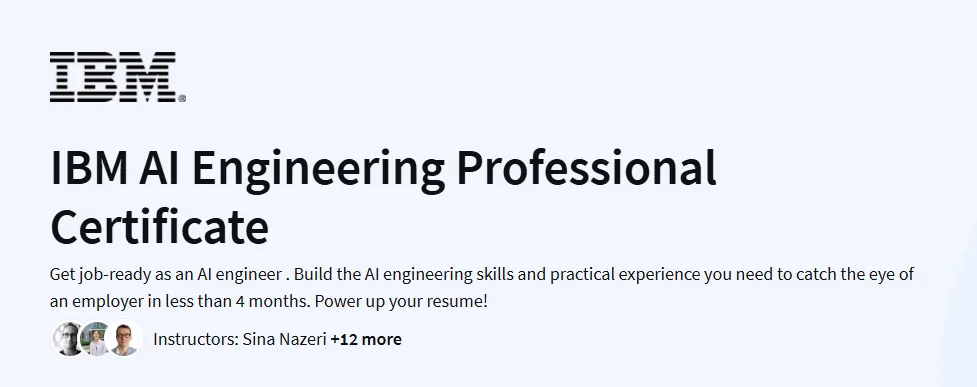What you will learn in IBM AI Engineering Professional Certificate Course
- This professional certificate offers a comprehensive introduction to AI engineering, focusing on machine learning and deep learning techniques.
- Learners will gain hands-on experience with Python libraries such as SciPy and Scikit-learn to implement supervised and unsupervised machine learning models.
- The program emphasizes the deployment of machine learning algorithms and pipelines using Apache Spark.
- Students will build and train deep learning models and neural networks utilizing frameworks like Keras, PyTorch, and TensorFlow.
- The curriculum covers key concepts including classification, regression, clustering, dimensional reduction, and neural network architectures.
- Real-world projects and labs provide practical experience in applying AI models to solve complex problems.
- The capstone project enables learners to showcase their skills by developing a comprehensive AI solution.
Program Overview
Machine Learning with Python
⏱️3-4 weeks
Explore the fundamentals of machine learning, including various algorithms and their applications.
Understand different types of machine learning algorithms and their use cases.
Implement classification techniques such as K-Nearest Neighbors and decision trees.
Perform regression analysis and evaluate models using appropriate metrics.
Gain proficiency in Python for machine learning tasks.
Introduction to Deep Learning & Neural Networks with Keras
⏱️4-6 weeks
Dive into deep learning concepts and learn to build neural networks using Keras.
Grasp the basics of deep learning and neural network architectures.
Develop and train shallow neural networks for various applications.
Apply techniques like dropout and batch normalization to improve models.
Utilize Keras for building and deploying neural networks.
Deep Neural Networks with PyTorch
⏱️4-5 weeks
Learn to construct and train deep neural networks using PyTorch.
Understand deep neural network components and architectures.
Implement convolutional neural networks for image recognition tasks.
Apply transfer learning to enhance model performance.
Gain hands-on experience with PyTorch for deep learning applications.
Building AI Applications with TensorFlow
⏱️4-5 weeks
Focus on creating AI applications using TensorFlow.
Develop and train models using TensorFlow’s high-level APIs.
Implement natural language processing and computer vision applications.
Optimize and deploy models in production environments.
Explore TensorFlow’s ecosystem for AI development.
AI Capstone Project with Deep Learning
⏱️6-8 weeks
Apply your knowledge to a real-world AI project, demonstrating your proficiency in deep learning.
Define a problem and develop a deep learning solution.
Collect, preprocess, and analyze relevant data.
Train and evaluate models to address the problem.
Present findings and insights through a comprehensive report.
Get certificate
Job Outlook
- The demand for AI engineers is rapidly increasing, with AI adoption projected to grow by 37.3% by 2030.
- AI skills are highly sought after in industries such as technology, healthcare, finance, and automotive.
- Entry-level AI engineers can expect salaries ranging from $90K to $120K annually, with experienced professionals earning more.
- Employers value expertise in machine learning frameworks like TensorFlow, PyTorch, and Keras, as well as proficiency in Python programming.
- This certification enhances job prospects for roles such as AI Engineer, Machine Learning Engineer, and Data Scientist.
- The IBM credential is recognized globally, adding credibility to your professional profile.
- AI engineering knowledge opens pathways to advanced roles in AI research and development.
- The growing reliance on AI solutions across sectors ensures strong job security and opportunities for career advancement.
Specification: IBM AI Engineering Professional Certificate
|
FAQs
- The course is designed for beginners, assuming no prior experience in AI or programming.
- It starts with foundational concepts in machine learning and deep learning, gradually progressing to more advanced topics.
- Python programming is introduced early on, with practical applications in machine learning tasks.
- Hands-on labs and projects reinforce learning and provide practical experience.
- Learners with a basic understanding of programming concepts will find the course accessible.
- Proficiency in Python for machine learning and deep learning applications.
- Experience with machine learning algorithms such as classification, regression, and clustering.
- Hands-on experience with deep learning frameworks like Keras, PyTorch, and TensorFlow.
- Ability to deploy machine learning models using Apache Spark.
- Skills in building and training neural networks for various applications.
- The certificate comprises multiple courses, each with an estimated completion time ranging from 3 to 8 weeks.
- The total duration depends on the learner’s pace, with an average completion time of 3 to 6 months.
- The course is self-paced, allowing learners to progress according to their schedules.
- Learners can start and finish courses at their convenience, making it suitable for working professionals.
- Access to course materials is available for a specified period after enrollment, ensuring ample time for completion.
- Equips learners with the skills required for roles such as AI Engineer, Machine Learning Engineer, and Data Scientist.
- The demand for AI engineers is rapidly increasing, with AI adoption projected to grow by 37.3% by 2030.
- Entry-level AI engineers can expect salaries ranging from $90K to $120K annually, with experienced professionals earning more.
- Employers value expertise in machine learning frameworks like TensorFlow, PyTorch, and Keras.
- The IBM credential is recognized globally, enhancing job prospects across various industries.
- The course includes hands-on labs and projects that simulate real-world AI engineering tasks.
- Learners will develop and train deep learning models using real datasets.
- The capstone project allows learners to apply their skills to a comprehensive AI solution.
- Projects cover various applications, including image recognition, natural language processing, and predictive modeling.
- These practical experiences help build a portfolio that can be showcased to potential employers.





